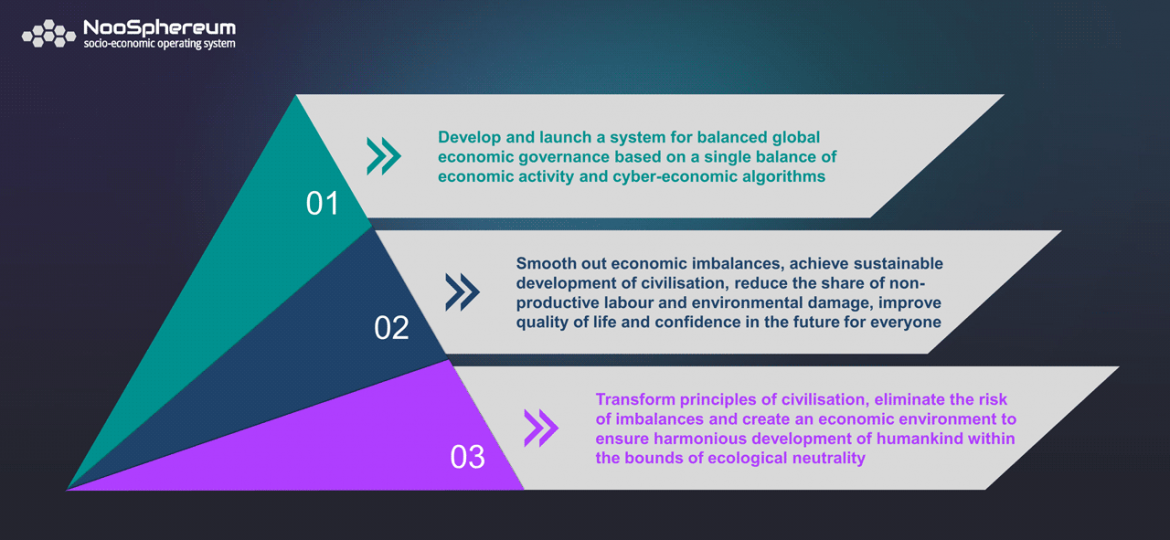
Our vision and mission define the vector of the project’s development. To clarify what we want to achieve, we have formulated our main goals. The objectives of the project are to move away from the global economy, governed by the spontaneous multidirectional aspirations of billions of economic actors.
Humankind should come to the economy managed through the implementation of agreed global and local goals with the account of feasible civilisation and eco-systemic constraints.
Goal #1Our goal is to develop and launch a system for balanced global economic governance based on a single balance of economic activity and cyber-economic algorithms. |
Goal #2Our goal is to smooth out economic imbalances, and achieve sustainable development of civilization, reduce the share of non-productive labour and the level of environmental damage, improve the quality of life and confidence in the future for each person. |
Goal #3Our goal is to transform principles of civilization, eliminate the risk of imbalances and create an economic environment that ensures long-term harmonious development of humankind within the bounds of ecological neutrality. |
There are interdependencies for the goals mentioned above. Without full implementation of the system and achieving goal #1, humankind will have no tools to implement intermediate goal #2 and the ultimate goal #3. These goals are associated with a profound transformation of the established decision-making system.
Unacceptable Delays
At present, there is an unacceptable time lag in the fulfilment of the decisions vital for society. Social movements, political parties or personal initiative trigger the process of adopting essential decisions in the existing governance model. This process ensures that governments react to fundamental challenges after a significant and sometimes unacceptable time.
This time lag frequently moves adopted decision beyond the threshold of relevance. In short, humanity often makes important decisions belatedly. This approach initially implies a multi-year delay between the occurrence of a problem and the initiation of work to solve it. This process is inefficient and does not correspond to the principles of rationality and the very nature of intelligent behaviour.
The modern way from the emergence of the challenge to the real impact of society on the root causes, such as troubled consumer and business decisions is too long. In most cases, society neglects a problem and does not bring its solution to real actions. Such management architecture is archaic and is the root cause of imbalances accumulating in the world.
A Quantum Leap into the Future
The proposed system helps to achieve a dynamic consensus on global and local goals. Based on the agreed goals, existing and planned economic activities are managed and regulated with transparent optimisation algorithms without excessive management layers. Objectives and their accompanying management impacts on economic entities are continuously adjusted and optimised. Optimisation processes are thus dynamic, and recommendations are recalculated continuously in response to changes in the plans of business entities, consumers and even governments.
The imperative of the Noosphereum Project is that humankind must stop considering economics to be a natural phenomenon governed by the spontaneous multidirectional aspirations of billions of economic actors. Civilisation must take a quantum leap to a new level of economic relations. It must build its future on optimal trajectories towards agreed global and local goals within the bounds of feasible resource and eco-systemic constraints. We offer a tool for this transition.
— Dmitri Rytsev, Founder of the Noosphereum
The operating system does not interfere with the process of generating ideas and private initiative. It does not affect fundamental human rights and freedoms, but manages economic conditions and optimises decisions on economic actions at their point of origin.
Let us imagine that the consumer is planning to purchase a specific product, and the production of this product is at odds with globally agreed goals. In this case, purely economic mechanisms such as the cost of resources or credit constraints adjust the production costs and therefore, the demand for such products.
Conversely, suppose a product or service supports the achievement of global goals. In that case, the same economic mechanisms contribute to the implementation of that consumer decision.
Adjustable Models
In order to determine how a particular economic decision affects the achievement of objectives, the system creates adjustable production models for each product or service type. Within the framework of such models, the system dynamically allocates each economic decision to its components, assesses its impact on global and local goals, and identifies environmental and social consequences and other important information.
This approach is one of the pillars of the operating system that enables the management of economic activities worldwide. The following posts provide a detailed description of the principles and mechanisms for operating the Noosphereum operating system. This information will make it possible to draw informed conclusions and make strategic decisions regarding creating this system and its use in the future.

